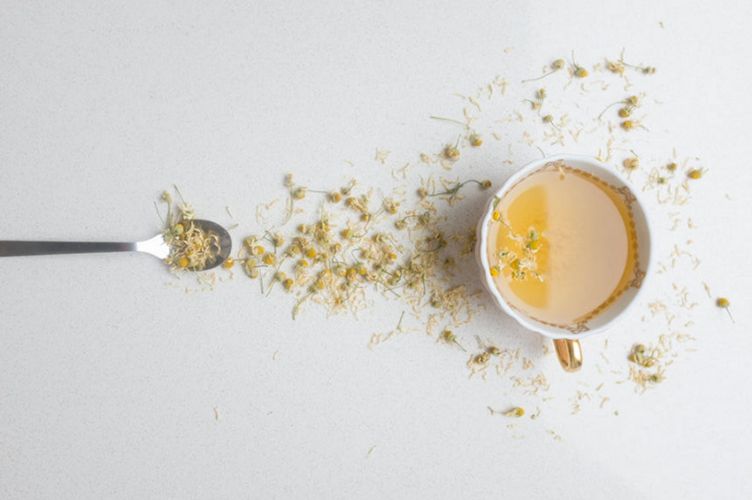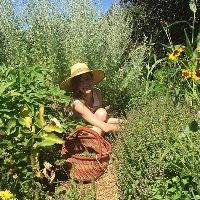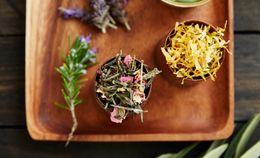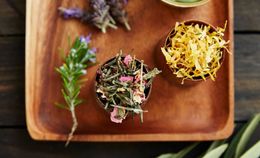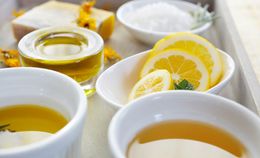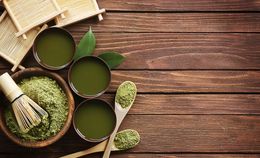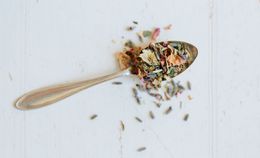Irritable Bowel Syndrome, commonly known as “IBS,” can feel like a tricky condition to work with sometimes since the array of symptoms can vary so much from person to person. In this article, I want to provide you with some of my go-to herbal therapeutics I draw from to support IBS from the root and for acute symptom relief. Depending on how your personal IBS picture presents, you may not need to reference every herbal therapeutic below. Think of this article as your herbal IBS “toolbox” which you can draw from as you see fit with your own health picture.
Gut Healing Herbs
The number one herbal category I utilize with almost all of my IBS clients are “gut healing herbs,” also known as vulneraries. Vulnerary herbs are indicated if there is any suspected damage to the colon lining. Oftentimes this issue can cross over or co-exist with Leaky Gut Syndrome. Gut healing herbs are typically more gentle, restorative, and typically carry few contraindications.
Since understanding the root of your IBS symptoms can often be cloudy and uncertain (it’s hard to actually see what's going on in there after all!), incorporating gentle, soothing, gut healing herbs long-term is usually a beneficial base to start building the rest of your herbal protocol from. Some of my favorite gut healing herbs are plantain (Plantago major), aloe (Aloe vera), calendula (Calendula officinalis), and chamomile (Matricaria recutita).
Soothing Inflammation
Inflammation-modulating herbs are another core category I incorporate for most of my IBS clients. With many IBS cases, whether they are caused by other formally diagnosed conditions or not, inflammation is typically an underlying root cause. Never use inflammation-modulating herbs to simply “cover-up” signs of inflammation though. Inflammation is typically a warning sign that something is amiss in the body or that you have taken on a high-inflammatory load for so long your gut has become constantly “inflamed” or irritated.
Utilize herbs that help modulate inflammation while addressing all of the other factors and symptoms involved with your IBS picture at the same time. Some essential herbs you can draw from here include chamomile, calendula, turmeric (Curcuma longa), and ginger (Zingiber officinale).
Gas Aids
Chronic gas and gas-related pains are common symptoms of IBS. Typically, gas is a sign of inflammation so incorporating inflammation-soothing herbs from the category above is key here too. Since modulating inflammation can take time, drawing from herbs which help relieve gas and gas-related cramping is good in the meantime. Key herbal actions that you want to look for in your gas aids are carminatives and antispasmodics.
Carminative herbs can help clear gas or colic and can be taken before or after eating. Conveniently enough, many carminative herbs also happen to be common kitchen herbs! Some classic carminatives are ginger, coriander (Coriandrum sativum), cardamom (Elettaria cardamomum), fennel (Foeniculum vulgare), and peppermint (Mentha piperita).
Antispasmodic herbs help quell spasms or cramps throughout the gastrointestinal system. If gas-related cramping is one of your main symptoms, consider drawing from this class of herbs. One of my favorite antispasmodic herbs for IBS is wild yam (Dioscorea villosa). Other gut-focused antispasmodic herbs I utilize for my clients include peppermint and chamomile. Note that if cramping is sharp and severe (as opposed to dull and/or achy) immediate professional medical attention is suggested.
Address Your Stress
Although you may not immediately connect your stress picture with your IBS, in many cases they are commonly interconnected. Ever heard of the “gut-brain axis” (GBA)? This biochemical signaling system allows communication to flow freely between our gut and brain. So, in a nutshell, when the gut is inflamed due to IBS-type symptoms, our brain triggers our nervous system to enter a state of high stress “fight-or-flight.”
This pathway works in both directions too. So if our nervous system is frayed due to chronic stress, IBS symptoms can flare in response. Since chronic stress tends to be an underlying cause in more health issues than just IBS, incorporating nervine herbs can provide even more broad-spectrum support. Nervine herbs which help restore and tonify function to the nervous system are typically my go-to category here. Some of my favorites include tulsi (Ocimum sanctum), passionflower (Passiflora incarnata), milky oats (Avena sativa), and skullcap (Scutellaria lateriflora).
Stepping Stones Toward IBS Support
After reading this article, I hope you feel more equipped to start supporting your IBS using natural herbal therapeutics. When in doubt, consult with your professional medical doctor and clinical herbalist. Message me or comment below with any questions you have or if you are in need of herbal support for your IBS!

